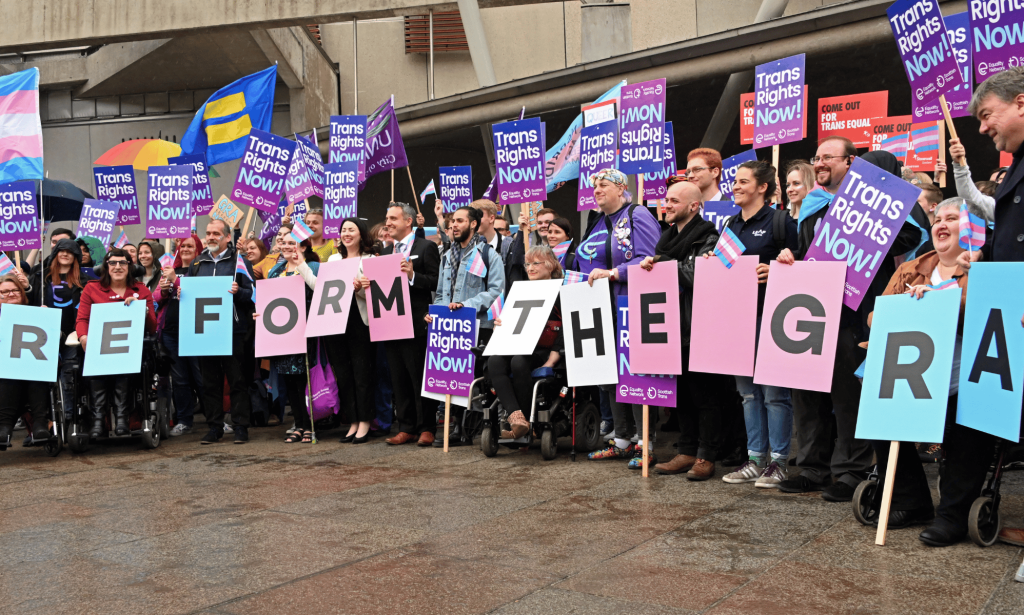Tory government to ask Scotland to relay gender law reform – despite years of thorough research

UK government to ask Scotland not to ‘rush’ into gender reforms – after six years of thorough research (Dan Kitwood/Getty Images)
UK Equalities Minister Kemi Badenoch is expected to intervene asking for delays ahead of Scotland’s vote on gender reform.
The legislation on gender reform, which aims to streamline the laborious process on how trans people can change their gender on legal documents in Scotland, has been backed by one of the UN’s leading voices on LGBTQ+ rights.
However Badenoch is now expected to ask the SNP to delay the changes, despite years of research and a public consultation having already taken place, the Daily Mail reported.
The legislation amends the Gender Recognition Act 2004 to introduce a new process to obtain Gender Recognition Certificates (GRC) in Scotland, which would remove barriers for trans people to change their gender identity on official documents.
If agreed, the laws would lower the age limit to apply for a Gender Recognition Certificate from 18 to 16, and shorten the period a trans person would have to socially transition before legally changing their gender.
Badenoch will reportedly meet Scottish social justice secretary Shona Robison on Tuesday (20 December) to discuss delaying the bill, which sailed through its first vote by 88 to 33 votes.
A Government source told the Daily Mail: “Kemi wants to understand what their evidence is. It’s an attempt to urge them to take heed of warnings about the bill, to rethink age limits and ensure there has been enough safeguarding.”
If the legislation is to go through, trans people would be able to self-identify without being required to get medical reports or a diagnosis in order to obtain a GRC.
Under current legislation, trans people must apply to a UK gender recognition panel and present reports as well as a diagnosis of gender dysphoria – a process that can take years given the immense wait lists at NHS gender clinics.
Colin Macfarlane, director of nations at Stonewall, said when the bill passed its first vote on 27 October that he was “delighted” that an “overwhelming majority of MSPs” voted in favour forming the law to allow trans people the right to legal recognition of their gender without “having to jump over outdated medical and administrative hurdles.”
“This is another milestone in Scotland’s journey to join over 30 countries around the world who have moved to a demedicalised process for legal gender recognition, affording trans people dignity and humanity.
“We now look forward to working with all MSPs as the bill goes through the next steps of parliamentary scrutiny.”
Despite Scotland moving to improve transgender rights in the country, legislation has faced difficulties in the past, with Liz Truss allegedly attempting to block reform in September.

Victor Madrigal-Borloz, one of the UN’s leading voices on gender identity, has endorsed Scotland’s Gender Recognition Act reforms, which will be voted on Tuesday (20 December).
Madrigal-Borloz, a UN Independent Expert on Sexual Orientation and Gender Identity, said: “Legal recognition of gender identity is a human right and self-identification is the appropriate standard for it.”
In his official report presented to the UN Human Rights Council about changes to the Gender Recognition Act in Scotland, he stated: “Within the United Nations Human Rights System, there is consensus on the imperative of legal recognition of gender identity and on the related standard of self-identification.
“It is my opinion that the Bill brings the Scottish system closer to conformity with those standards and, therefore, it is an act of compliance with obligations incumbent upon the State under international human rights law.”
Madrigal-Borloz also noted his worry over “stigma” and “prejudice” that could impede the bill’s passing.
“I have also observed exclusionary narratives in the public discourse surrounding the consideration of the Bill, and against trans persons more generally,” he said.
How did this story make you feel?

